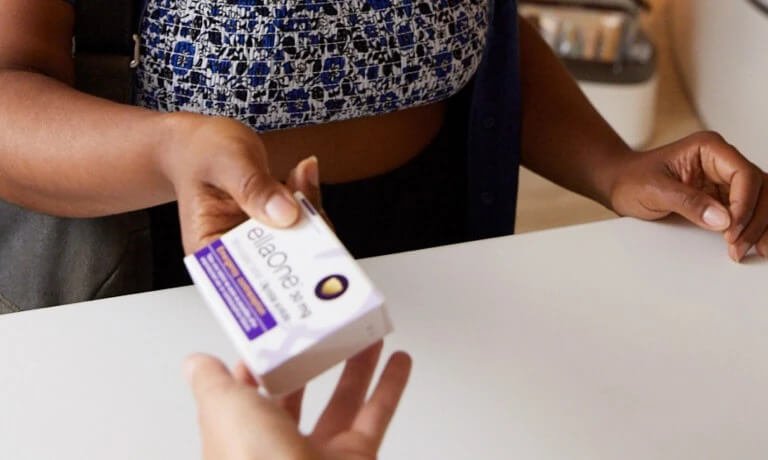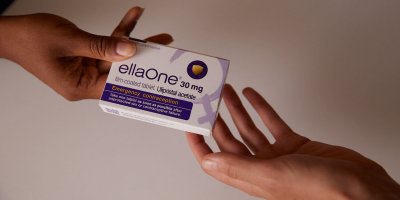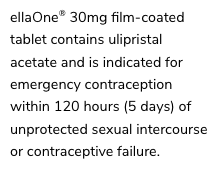Why the morning after pill is part of consent culture
Dr. Caroline West is a consent educator, the host of the Glow West podcast, the sex and relationship expert for Bumble Ireland and a relationship advice columnist for the Irish Independent. She holds a PhD and MA in Sexuality Studies from Dublin City University. In her latest role, she’s teamed up with morning after pill brand ellaOne, as part of their #ShareTheFacts campaign, to share her wisdom on sex, contraception and consent culture in Ireland.
Caroline is passionate about creating spaces for calm, informed conversations about sex, and works to reduce shame and stigma around sex in Ireland. In the third of her monthly blog posts, she discusses how the morning after pill is part of consent culture:
While it is a relatively new term, consent culture is a way to radically change how we view sex, sexual violence, our sexual heath, and our choices around our bodies and our family planning. Consent culture is the opposite to rape culture. In rape culture, sexual violence is common, victims are blamed, and perpetrators escape justice. However, in consent culture, everyone has access to education on consent, victims are supported with services and access to justice, and sexual violence is mimimised. Consent education begins in childhood and develops throughout the lifespan. Does this mean we need to teach children about sexual violence? Yes – in age-appropriate ways. We do this by teaching children that their bodies are their own, and no one can touch them without consent, and if this does happen, they can tell a trusted adult. We teach children that their ‘yes’ and ‘no’ should be respected, and that if someone ignores this, that is not good. By instilling this foundation built on boundaries and respect, children are much better placed to protect themselves and understand healthy and unhealthy relationships in their teenage years and adulthood.
Part of consent culture is understanding that sexual violence is a spectrum which includes in-person sexual violence, online sexual violence such as sending nudes without consent, and reproductive coercion. When we educate ourselves about the nuances of consent and abuse, we can empower victims too. We can do this by reducing victim blaming (which often comes from a lack of education), increasing access to support services, and providing holistic sex education which includes information about contraception choices as well as information about domestic abuse.
Ireland has been silent on domestic abuse for a long time – it was legal for a husband to rape his wife until 1990 and women trying to flee a violent marital situation could not divorce an abusive partner until 1996. While this silence is thankfully being drowned out by awareness and education, many people often assume that domestic abuse often involves physical abuse. This is of course true in many cases, but domestic abuse also includes financial abuse, coercive control, digital abuse, and sexual abuse. All of these forms can exist on their own or be combined with other forms of abuse and contain many nuances in each case. We might have previously only thought of sexual abuse as consisting of violent rape, but there are a wide range of behaviours that can be considered as sexual abuse, and reproductive coercion can be one of these, even if it is a term that we may not be familiar with.
Reproductive coercion is defined as interference with a person’s autonomy in making decisions about their reproductive health. Every person should be free to make informed decisions about their sexual partners, their sexual health, and their reproductive health. If someone is prevented from doing this, this is reproductive coercion and part of the spectrum of intimate partner abuse. Forcing someone to have a pregnancy when they did not choose to be is a fundamental breach of their human rights.
The morning after pill can help a person prevent unwanted pregnancy in many situations, but especially in situations of abuse this can be a lifeline for the person if they are trying to prevent pregnancy while in an abusive situation. Enabling access to the morning after pill helps victims in crisis and allows them to maintain autonomy in a situation where it may be stripped from it by their partner. This access may be lifesaving and may mean more freedom to escape the abuse. Reproductive rights can mean empowering people to have children on their terms, but it can also mean the ability to choose not to have children for whatever reason the person wants.
Reproductive justice is a concept that is strongly connected to consent culture. It was developed in the US by Black women in the 1990s who highlighted how access to reproductive rights was not equal for everyone. For example, not everyone can afford to buy contraceptives, or access information on reproductive rights. Race, class, ability/disability, language, and many other factors mean that even if contraception is legal, it is not accessible for all, and marginalized groups experience more barriers to reproductive justice than more privileged groups. For example, abortion access is now legal in Ireland, but not accessible to all, and many horrific cases make the headlines in the US especially now that Roe v Wade has been repealed and many states have tried to make abortion as inaccessible as possible. Some activists may argue that such widespread restriction on reproductive rights is national reproductive coercion, and reproductive coercion can also be present in communities where stigma, pressure, and exclusion may be in place for those who do not follow the status quo on family planning. Access to the morning after pill provides options for those stuck in difficult situations to manage an emergency, and this access should be intersectional – allowing all people in society to access it.
Inclusive and modern consent education and sex education should include information about contraception. This has not been the case in every school in Ireland, and when discussions on contraceptives have been allowed, it has often focused on the pill and condoms. This means that many people are unaware of LARCs (long-acting reversible contraceptives such as the injection, implant, or IUD), and they may not have heard of the morning after pill or may believe misinformation about it. This includes myths about how it works, if it is the same as an abortion pill, or that it works for all weights and timeframes. It is important to provide this information so that if a situation suddenly arises and a person is in crisis, they don’t have to waste time figuring out facts from fiction and can make informed decisions about their options. Given that the time frame for the effectiveness of the morning after pill is short, having to spend time sifting through potentially misleading information is not the right way to empower people to enact their reproductive rights or access reproductive justice. We can change our society through building consent culture that includes contraception education.









